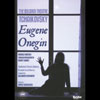Tchaikovsky Eugene Onegin
Some decent singing and playing cannot redeem this troubled production
View record and artist detailsRecord and Artist Details
Composer or Director: Pyotr Ilyich Tchaikovsky
Genre:
DVD
Label: Bel Air Classiques
Magazine Review Date: 9/2009
Media Format: Digital Versatile Disc
Media Runtime: 0
Catalogue Number: BAC046

Tracks:
| Composition | Artist Credit |
|---|---|
| Eugene Onegin |
Pyotr Ilyich Tchaikovsky, Composer
Alexander Vedernikov, Conductor Anatoli Kotscherga, Prince Gremin, Bass Bolshoi Theatre Chorus Bolshoi Theatre Orchestra Makvala Kasrashvili, Larina, Mezzo soprano Margarita Mamsirova, Olga, Contralto (Female alto) Mariusz Kwiecien, Eugene Onegin, Baritone Pyotr Ilyich Tchaikovsky, Composer Tatiana Monogarova, Tatyana, Soprano Valery Gilmanov, Zaretsky, Bass |
Author: John Steane
But there is trouble on stage from the very start. The curtain rises prematurely, so that the Prelude loses the opportunity to draw the mind in with its familiar, gentle and affectionate tunes and the characters are kept too long without anything to sing. But there is also a moment of self-conscious silence first, so that even this gets off to a bad start. The scene, usually set out of doors, showing garden and fields beyond, is now moved inside, and the mood, normally dreamily domestic, is now one of awkward merriment with peals of uncaused laughter from Madame Larin at the head of a long table at which are seated her guests. This table, stretching almost the width of the stage, is to be a permanent feature. It serves for Tatiana’s letter and even the scene of Lenski’s death, which here occurs not in a duel but as Lenski and Onegin struggle for possession of the gun.
There is worse. Lenski (out of character) does a life-and-soul-of-the-party turn and (out even of this character) sings M Triquet’s song. During his plea (“Vashem domye”) an inane youth grins from ear to ear, and during his lament (“Kouda”) an idiot woman sits ogling and making up to him. And, as somebody remarks in Julius Caesar, “There was more foolery yet, if I could remember it”, but maybe that is enough to be going on with.
Discover the world's largest classical music catalogue with Presto Music.

Gramophone Digital Club
- Digital Edition
- Digital Archive
- Reviews Database
- Full website access
From £8.75 / month
Subscribe
Gramophone Full Club
- Print Edition
- Digital Edition
- Digital Archive
- Reviews Database
- Full website access
From £11.00 / month
Subscribe
If you are a library, university or other organisation that would be interested in an institutional subscription to Gramophone please click here for further information.





